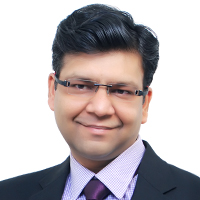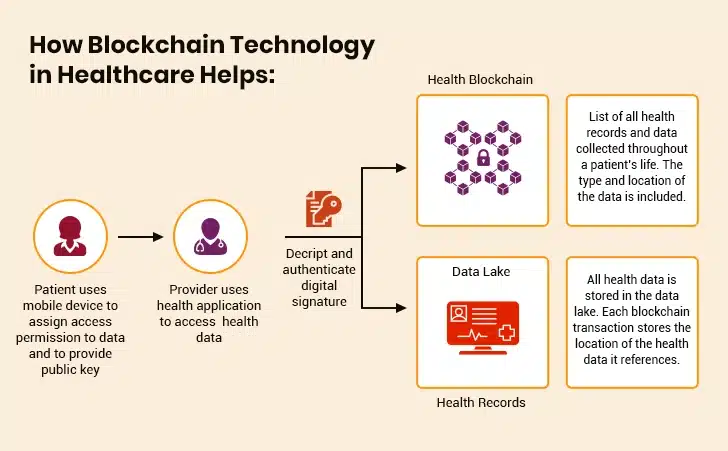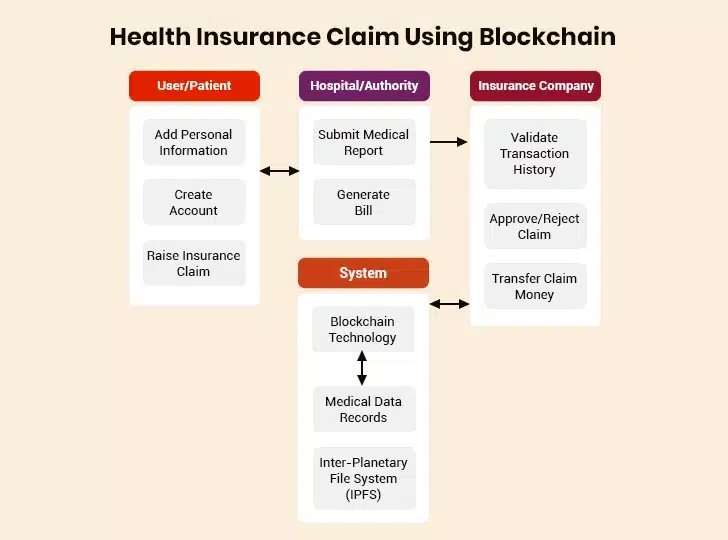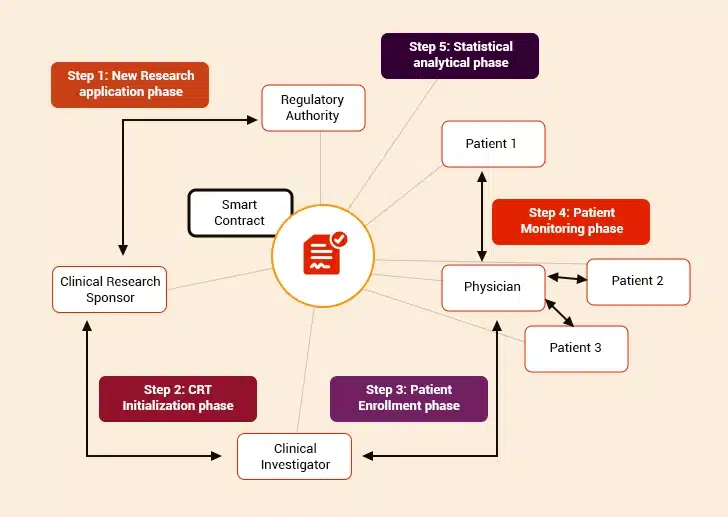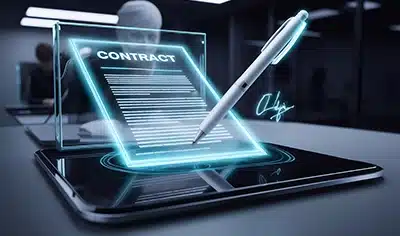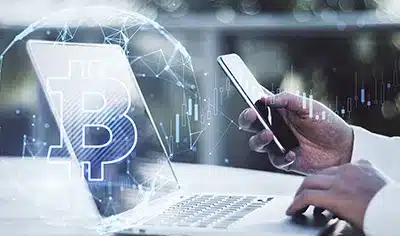How secure are patient medical records in a modern digital healthcare environment? Unfortunately, healthcare data breaches occur regularly, exposing millions of patient records to cybercriminals. They exploit this sensitive information to commit fraud. These security failures happen since traditional electronic medical record systems have loopholes that make them attractive targets for cybercriminals.
Beyond security issues, current electronic medical record systems create operational problems that impact the quality of patient care. Many medical facilities cannot easily share patient information with other healthcare providers, leading to fragmented care where important health details get lost between different healthcare settings. Fortunately, Blockchain technology offers a promising solution to these longstanding problems by creating a tamper-proof digital ledger for medical records. This innovative approach can give patients better control over their health data while helping healthcare providers work together more effectively to deliver quality care.
This detailed post will walk you through the common challenges of EMR in healthcare and how Blockchain technology overcomes them. The post also delves into the key benefits of Blockchain-based EMR in healthcare and key applications of Blockchain in healthcare settings. Finally, the post explores the future of Blockchain-based EMR in healthcare.
Table of Contents
What are the Key Challenges of EMR in Healthcare and How Blockchain Overcomes Them?
- Challenge 1: Data Security
- Challenge 2: Privacy Concerns
- Challenge 3: Data Silos
- Challenge 4: Fake Medical Records
- Challenge 5: Slow Information Sharing
- Challenge 6: High Data Storage and Maintenance Costs
- Challenge 7: System Failures and Downtime
What are the Key Benefits of Blockchain-Based EMR in Healthcare?
- Accurate Medicine Tracking
- Easy Medical Data Access from Anywhere
- Smooth Insurance Claims
- Better Research for New Treatments
- Records That Cannot Be Changed
- Following Healthcare Laws
What are the Key Applications of Blockchain EMR in the Broader Healthcare Ecosystem?
What are the Key Challenges of EMR in Healthcare and How Blockchain Overcomes Them?
EMR systems are useful but not perfect. They often make sharing medical records between hospitals complicated. Blockchain provides answers to such common issues. Let’s look at the key challenges and how Blockchain technology in healthcare helps create better systems for patient information.
Challenge 1: Data Security
How Blockchain in Healthcare Helps:Blockchain addresses the security gaps by creating strong protection walls around medical data. The technology makes patient information nearly impossible to steal through its decentralized architecture and cryptographic security measures. By using special codes for safety, Blockchain effectively blocks unauthorized people from accessing sensitive medical records completely. This comprehensive security framework ensures that patient information remains secure, thereby restoring confidence in digital healthcare systems.
Challenge 2: Privacy Concerns
Patients worry about who can see their medical records. The reason behind this is that they have no control over who views their medical history. Sometimes personal health information gets shared with the wrong people. This makes people afraid to share critical health details with doctors.
How Blockchain Technology in Healthcare Helps:
Blockchain revolutionizes healthcare privacy by giving patients full control over their data. The technology shows exactly who accessed medical records and when, creating complete transparency in data usage. Patients can block access to their information and have the power to grant or deny permission for specific healthcare providers to view their records. This transparent access tracking system protects patient privacy rights completely and builds trust by ensuring patients remain in control of their sensitive medical information.
Challenge 3: Data Silos
Different healthcare facilities employ different IT systems that do not exchange information seamlessly. When patients visit new doctors, their medical records stay stuck in old systems. Owing to this, doctors cannot see complete patient records from other hospitals. This creates problems when patients need emergency healthcare.
How Blockchain in Healthcare Helps:Blockchain technology eliminates data silos by connecting all hospital systems through a unified network. It enables seamless data sharing across different platforms and creates one universal medical language that all healthcare systems can understand. By connecting patient records from everywhere, Blockchain makes information flow smoothly between hospitals, ensuring that healthcare providers have access to complete patient histories regardless of where the original treatment initiated.
Challenge 4: Fake Medical Records
Some dishonest individuals create false medical records to get medicines illicitly. They also alter their medical history for insurance benefits. Doctors sometimes cannot even tell if patient records are real or fake. This creates critical situations when treating patients. Moreover, wrong medical information may lead to harmful treatments.
How Blockchain Technology in Healthcare Helps:Blockchain technology creates an immutable record-keeping system that prevents any record changes. The technology creates unchangeable medical history stamps that serve as digital fingerprints for authentic medical data. Every attempt to modify records is tracked and visible, allowing the system to verify that all information is genuine. This prevents fake records completely, ensuring that healthcare providers can trust the authenticity of patient information and make informed treatment decisions.
Challenge 5: Slow Information Sharing
Getting medical records from one hospital to another takes too much time. Patients have to wait for days to get their health information transferred. As a result, emergency health situations become critical when doctors cannot access the history of patients quickly. Paper forms and slow computer systems also delay important medical decisions. Overall, fast treatment gets delayed because of slow record sharing.
How Blockchain in Healthcare Helps:Blockchain technology transforms information sharing by enabling real-time record access across all healthcare networks. It eliminates waiting periods for data transfer and creates an instant information access system that healthcare providers can use immediately. This approach speeds up all medical processes and provides immediate record availability everywhere, ensuring that critical medical decisions are not delayed by technological limitations.
“Blockchain turns EMRs from static repositories into living ecosystems of verified health data.” – Dr. John Mattison, Former CMIO, Kaiser Permanente.
Challenge 6: High Data Storage and Maintenance Costs
Hospitals frequently incur substantial costs to store medical records safely. They regularly repair and update their computer systems, which costs a lot. Furthermore, hiring technical staff to manage large medical databases is also expensive. These high costs make healthcare more expensive for everyone.
How Blockchain Technology in Healthcare Helps:Blockchain reduces storage costs by distributing data across a network rather than requiring expensive centralized systems. The technology eliminates expensive maintenance requirements completely through its self-sustaining network architecture. By sharing costs among all users in the network, Blockchain reduces the financial burden on individual healthcare facilities. Additionally, the system needs fewer technical staff members to maintain, making record keeping more affordable for healthcare organizations.
Challenge 7: System Failures and Downtime
Hospital computer systems sometimes stop working completely. When systems crash, doctors can’t access any patient records. Technical problems at times last for hours or days. During system failures, medical care becomes difficult. Hospitals might lose important patient information when systems break down.
How Blockchain Helps:Blockchain technology guarantees continuous system operation with zero downtime. The distributed nature of Blockchain ensures it keeps working even when there are technical issues with specific nodes in the network. By storing copies of medical records in multiple locations, Blockchain provides automatic backup systems that ensure continuous record access forever. This eliminates the risk of complete system failures and guarantees that healthcare providers always have access to critical patient information when they need it most.
What are the Key Benefits of Blockchain-Based EMR in Healthcare?
Healthcare needs better ways to handle patients medical records. Blockchain in healthcare offers solutions that make records safer and more useful. Take a quick look to explore how this technology helps improve healthcare records for patients and providers alike.
1. Accurate Medicine Tracking
Blockchain plays a crucial role in tracking medicines until they reach patients. This helps ensure authenticity and safety. With Blockchain-based EMR, pharmacies can verify drug authenticity before giving it to patients. Doctors can also see the full journey of any drug they prescribe. This transparent tracking prevents patients from dangerous fake medications that might be harmful. The system also helps build trust by maintaining traceability throughout the process.
“Blockchain in EMRs isn’t about the technology – it’s about restoring trust in healthcare data ecosystems.” – Dr. John D. Halamka, President, Mayo Clinic Platform.
2. Easy Medical Data Access from Anywhere
Patient medical records on Blockchain can be accessed from any hospital worldwide. When a patient moves to a new city, doctors there can view the complete health history of the patient if granted permission. This means patients don’t need to carry paper files or remember all their medical details. Emergency doctors can see key information about allergies or any critical condition, even if patients don’t speak. This quick data access helps doctors make better decisions about patient treatment. Overall, patients’ medical records follow them wherever they go, making healthcare much more convenient and quicker.
3. Smooth Insurance Claims
When patients need to claim money from insurance companies for medical care, Blockchain records make the whole thing faster and simpler. Insurance companies can check patients medical records and confirm that the treatment really happened. With Blockchain EMR, there will be less paperwork to deal with and fewer delays in getting claims. Moreover, the records are so clear and reliable that insurers can give the go-ahead for claims in no time. This means patients get insurance claims sooner without having to wait for longer periods. The entire process becomes more efficient for everyone involved.
Explore the Top Use Cases of Blockchain in Insurance: Transforming Operations
4. Better Research for New Treatments
Researchers can tap into Blockchain for health records to study illnesses and come up with new treatment methods. Large sets of medical data of patients help researchers spot trends and discover new drugs faster. This research can result in improved care for future patients with similar health issues. In other words, the medical data of a patient plays a crucial role in helping other patients get better treatment, but the data remains anonymous. This creates a loop where everyone gets the benefits of shared medical insights.
5. Records That Cannot Be Changed
When data enters a Blockchain health record, it remains there without the possibility of accidental deletion or modification. This creates a full timeline of patient health that doctors can rely on. Any attempt to alter past information becomes visible to all, along with the identity of the person responsible. This ensures the patient’s medical history stays accurate. Doctors can also review patients’ past treatments and pinpoint what was effective and what fell short. This permanent record helps doctors make improved decisions for future care and treatment plans.
6. Following Healthcare Laws
Healthcare facilities need to follow a lot of government regulations about keeping patient data secure and confidential. The Blockchain technology is designed to follow these rules on its own, without extra effort from hospital staff. The system keeps detailed records of who accessed files and when they did so. This makes it effortless to show government inspectors that the hospital is adhering to all the required guidelines. Moreover, hospital staff don’t need to stress about breaking rules since the Blockchain system guides them to do everything correctly. This automatic compliance protects both patients and healthcare staff from legal troubles.
Top Use Cases of Blockchain Technology Across Industries
What are the Key Applications of Blockchain EMR in the Broader Healthcare Ecosystem?
Using Blockchain for electronic medical records opens up many possibilities. From better patient care to medical research, this technology has several practical applications. Here’s how different parts of the healthcare system are putting Blockchain-based EMR to work in real situations.
| Key Application | What It Does | How It Helps |
|---|---|---|
| Patient Records | Stores all medical history in one secure place. | Doctors can see patients’ full health records instantly, no matter which hospital they visit. |
| Doctor Visits | Keeps track of all appointments and treatments. | No need to repeat medical history to every new doctor. |
| Prescription Management | Records all medicines patients take and their effects. | Prevents dangerous drug combinations and tracks what works for patients. |
| Insurance Claims | Automatically processes insurance paperwork. | Faster payments to hospitals and less paperwork for patients. |
| Clinical Research | Helps researchers study diseases while keeping the identity of patients private. | Better treatments get developed faster using real patient data. |
| Preventive Care | Tracks patient health patterns and reminds them about check-ups. | Catches health problems early before they become serious. |
| Lab Results | Stores all test results of a patient in one place. | Both patients and doctors can compare results over time to spot health trends. |
| Drug Safety & Tracking | Tracks medicines from the factory to the pharmacy. | Prevents fake drugs. |
| Home Health Monitoring | Records data from health devices that patients use at home. | Doctors can monitor the health of patients between visits. |
What is the Future of Blockchain-Based EMR in Healthcare?
The future of healthcare looks brighter with Blockchain technology since it makes everything more connected. More hospitals will start using Blockchain-based EMR to keep medical records safe and easy to find. These new systems will be much better at protecting medical information from hackers and people who should not see it. Patients will have full control over who sees their health information and can share it quickly with any doctor. The technology will also connect all healthcare providers together, so every medical practitioner has access to the same updated information. Many countries are already testing Blockchain-based health systems in small areas before rolling them out everywhere.
Blockchain-based EMR will also make healthcare affordable and accessible, which means even small clinics will be able to afford it. Healthcare facilities will spend less money on managing medical records, and these savings will be passed on to patients. Furthermore, researchers will discover new treatments faster using anonymized health data. Doctors worldwide can work together on difficult cases, bringing expert help to patients everywhere. Overall, Blockchain will make healthcare better for millions of people across the world.
Drive Business Impact with Damco’s Expertise
Blockchain is transforming healthcare by fixing the biggest problems with electronic medical records. Traditional EMR often faces several issues, from security risks to slow information sharing between hospitals, and outdated information. Blockchain fixes these by creating a secure, unchangeable system where only authorized people can access patient data. In other words, Blockchain makes healthcare records more reliable and useful.
The benefits of Blockchain in healthcare go beyond just managing medical records. Blockchain can help track medicines, speed up insurance claims, and even support medical research. The future of EMR is here, and it’s built on Blockchain. If you are planning to adopt a Blockchain-based EMR system to provide smoother care with fewer delays, you may seek consultation from reliable Blockchain experts like Damco.


